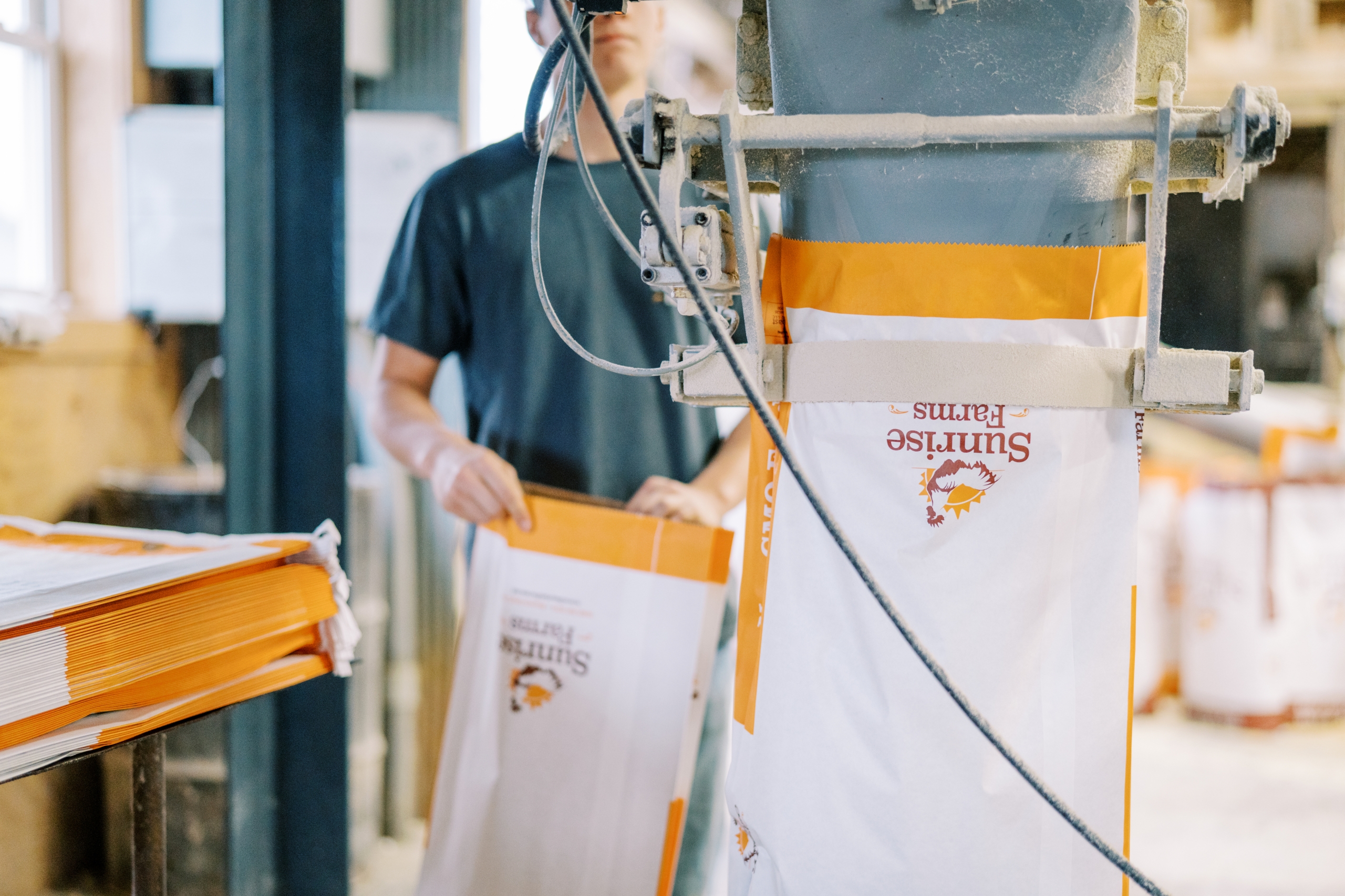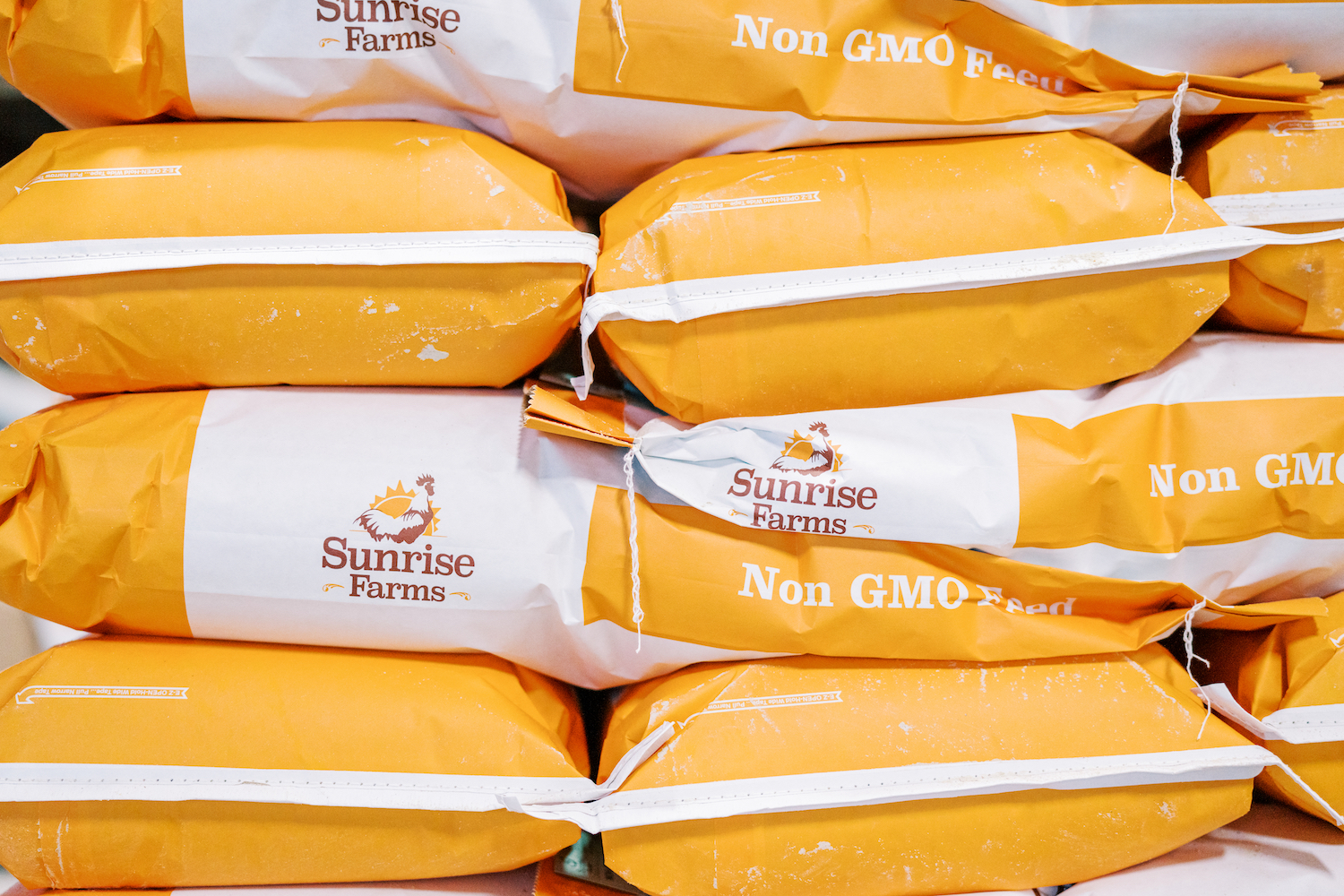Making Quality Feed Starts With Testing For GMOs.
Feed is only as good as the quality of the grains that go into it. That’s why we test our primary grains before we mill them at our onsite facility. Using testing strips, we can determine the presence of genetically modified organisms (GMOs) in the grains that enter our mill. Our standards and practices were reviewed and approved by the Non-GMO Project, an organization dedicated to transparency in the agricultural and food industries. We can now proudly label our feed as Non-GMO Verified. But beyond non-GMO testing, at Sunrise Farms, we test our primary grains for glyphosates and pesticides.
Grain Testing Determines Levels of Glyphosate & Other Harmful Pesticides.
Maintaining herd health is critical to raising profitable meat and dairy for your business. Healthy animals eat high-quality feed and graze on pesticide-free pasture. While technological breakthroughs have made modern farming easier than in previous decades, they’ve also created challenging issues related to animal and environmental health. At Sunrise Farms, we test our primary grains — corn, soybeans, and field peas — for glyphosate levels and other pesticides to be confident that our Non-GMO feed is superior.
What Are Glyphosate-Based Herbicides (GBHs)?
Glyphosate is an herbicide applied to plants’ leaves to promote growth and control weeds. It is the main ingredient in Monsanto’s Roundup®, an incredibly popular herbicide used by farmers worldwide. Monsanto introduced this sodium-based chemical in 1974. It has become an industry leader in pesticide applications since then. It has also drawn criticism in conversations regarding pesticides and their effects on animal and human health.
What’s The Conflict Over Glyphosates?
The first significant studies provided conflicting reports regarding the dangers associated with glyphosate.
- WHO: In 2015, the World Health Organization (WHO) proclaimed glyphosate as “probably carcinogenic in humans”(1). They based this declaration on smaller studies of people diagnosed with cancer and analyses based on pure glyphosate’s effects on animals in the lab.
- EPA: The Environmental Protection Agency (EPA) assessed animal feeding studies and determined that there was no evidence that glyphosate is toxic to the central nervous system, immune systems or reproductive systems(2).
These conflicting studies have motivated scientists, farmers and agencies to further their research into the effects of glyphosate on human, animal and environmental health.
Glyphosates Probably Cause Cancer.
Glyphosates have been legally linked to cancer cases throughout the U.S. The people filing suit against companies like Monsanto are primarily farmers diagnosed with cancers like non-Hodgkin’s lymphoma(3). These farmers were exposed to high levels of the chemical while spraying their crops for years. Studies also show glyphosate can affect hormonal balances in humans and cause health issues like breast cancer. While most of the sick farmers were exposed to incredibly high levels of glyphosate, those cases show that we need long-term studies to determine the impact of glyphosates on people, animals and the environment.
Glyphosate Affects Crop Yield & Nutrition.
Farmers use glyphosate to protect crops from weeds and promote rapid growth. Here’s the problem:
- Quick Growth: Quick growth doesn’t allow plants to root deeply into the ground, which affects soil health and erosion. Deeper roots promote the development of beneficial microbes that hinder pathogens and keep plants and soil healthier.
- Lower Germination Rates: Some plant species have shown lower germination rates when treated with Glyphosate-Based Herbicides (GBHs)(5). Lower rates can affect your timeline and inventory of products to market.
- Less Nutritious: Studies have shown that soybeans treated with GBHs are less nutritious than soybeans that have not been exposed to Roundup® or some other type of GBH pesticide(6).
How Do Glyphosates Affect Herd Health?
Studies haven’t shown a clear and definitive connection between grain treated with GBHs and overall animal health. Some studies show no negative impact after using glyphosate on crops. Those particular studies have almost all been conducted on animals in vitro(7). Other studies indicate that glyphosate’s effect on microbiota production and gut health may impact an animal’s stomach bacteria, especially in young animals. Scientists believe glyphosates are a major player in the collapse of U.S. bee colonies. The chemical disrupts the microbial community in bees’ digestive systems(8).
We Need More Studies Without Involving Big Agriculture.
There is limited research on the effects of glyphosate on animal, human and environmental health. What research is available tends to be short-term studies funded by major agricultural companies, like the Monsantos of the world. Scientists need to further our understanding of this powerful chemical through in-depth long-term and short-term studies of animals, people, soil and waterways. Only then will we be able to draw a clear picture of the effects of glyphosate. For now, we’ll keep milling our Non-GMO feed with grain-tested products from local, family farms.
(1) ”World Health Organization” IARC Monograph on Glyphosate. Accessed 8/29/22 <https://www.iarc.who.int/featured-news/media-centre-iarc-news-glyphosate/>
(2) ”National Pesticide Information Center” Glyphosate. Accessed 8/28/22 <http://npic.orst.edu/factsheets/glyphogen.html>
(3) Matthews, Lee, B.A. 2020 “Gene Food” Why Glyphosate is Dangerous, and How To Avoid Eating It. Accessed 8/29/22 <https://www.mygenefood.com/blog/why-glyphosate-is-dangerous-and-how-to-avoid-eating-it/>
(4) 2018 ”Noble Research Institute” Why Roots Matter To Soil, Plants and You Accessed 8/29/22 <https://www.noble.org/news/publications/ag-news-and-views/2018/june/why-roots-matter-to-soil-plants-and-you/>
(5) Marjo Helander, Anna Pauna, Kari Saikkonen & Irma Saloniemi “Nature” Glyphosate Residues In Soil Affect Crop Plant Germination And Growth Accessed 8/28/22 <https://www.nature.com/articles/s41598-019-56195-3#>
(6) T.Bohn, M. Cuhra, T. Traavik, M. Sanden, J. Fagan, & R. Primicerio “Science Direct” Compositional Differences in Soybeans on The Market: Glyphosate Accumulation in Roundup Ready GM Soybeans Accessed 8/29/22
<https://www.sciencedirect.com/science/article/pii/S0308814613019201>
(7) M.T. Sorenson, H.D. Poulsen, C.L. Katholm, & O. Hojberg “Science Direct” Review: Feed Residues of Glyphosate – Potential Consequences for Livestock Health & Productivity Accessed 8/28/22
<https://www.sciencedirect.com/science/article/pii/S1751731120300264>





